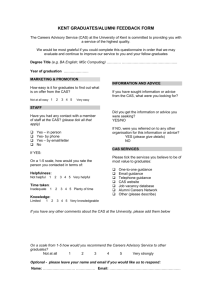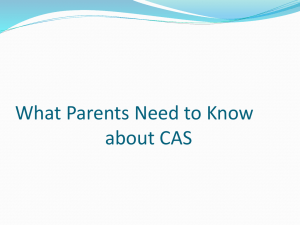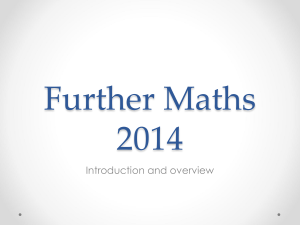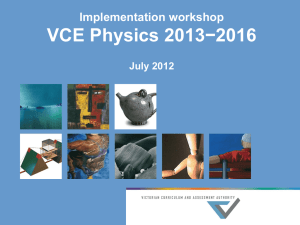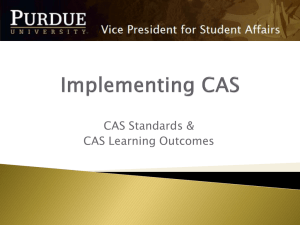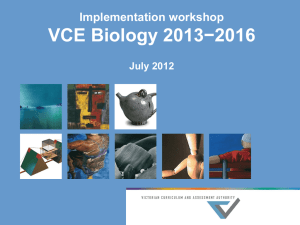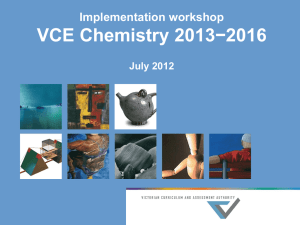Expression of Interest Mathematical Methods (CAS) Examination 2
advertisement
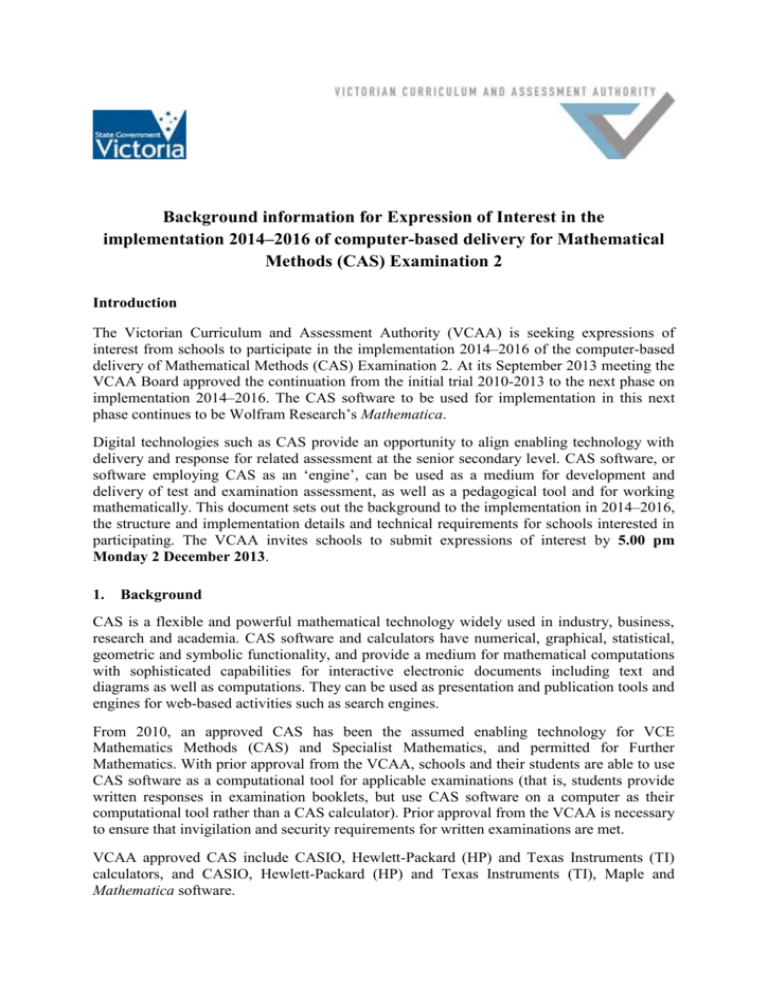
Background information for Expression of Interest in the implementation 2014–2016 of computer-based delivery for Mathematical Methods (CAS) Examination 2 Introduction The Victorian Curriculum and Assessment Authority (VCAA) is seeking expressions of interest from schools to participate in the implementation 2014–2016 of the computer-based delivery of Mathematical Methods (CAS) Examination 2. At its September 2013 meeting the VCAA Board approved the continuation from the initial trial 2010-2013 to the next phase on implementation 2014–2016. The CAS software to be used for implementation in this next phase continues to be Wolfram Research’s Mathematica. Digital technologies such as CAS provide an opportunity to align enabling technology with delivery and response for related assessment at the senior secondary level. CAS software, or software employing CAS as an ‘engine’, can be used as a medium for development and delivery of test and examination assessment, as well as a pedagogical tool and for working mathematically. This document sets out the background to the implementation in 2014–2016, the structure and implementation details and technical requirements for schools interested in participating. The VCAA invites schools to submit expressions of interest by 5.00 pm Monday 2 December 2013. 1. Background CAS is a flexible and powerful mathematical technology widely used in industry, business, research and academia. CAS software and calculators have numerical, graphical, statistical, geometric and symbolic functionality, and provide a medium for mathematical computations with sophisticated capabilities for interactive electronic documents including text and diagrams as well as computations. They can be used as presentation and publication tools and engines for web-based activities such as search engines. From 2010, an approved CAS has been the assumed enabling technology for VCE Mathematics Methods (CAS) and Specialist Mathematics, and permitted for Further Mathematics. With prior approval from the VCAA, schools and their students are able to use CAS software as a computational tool for applicable examinations (that is, students provide written responses in examination booklets, but use CAS software on a computer as their computational tool rather than a CAS calculator). Prior approval from the VCAA is necessary to ensure that invigilation and security requirements for written examinations are met. VCAA approved CAS include CASIO, Hewlett-Packard (HP) and Texas Instruments (TI) calculators, and CASIO, Hewlett-Packard (HP) and Texas Instruments (TI), Maple and Mathematica software. CAS software licences can provide a cost-effective means of supplying enabling technology to students in the school environment, and CAS software can be used to integrate pedagogical, curriculum and assessment practices. The VCAA Computer-Based Examination (CBE) for Mathematical Methods (CAS) Examination 2 uses Wolfram Research’s CAS software Mathematica to develop, deliver and run this examination, which is a digital version of the corresponding pen-and-paper examination. Schools wishing to be involved in the implementation for 2014-2016 will need to be able to provide participating teachers and students with access to Mathematica for use at school and at home. 2. Structure and schedule of the implementation 2014–2016 The implementation in 2014-2016 will be scheduled across three one-year stages from Year 10/pre VCE through to Year 12 as indicated in the following table. Year Students from initial trial schools Students from 2014 2016 implementation schools1 2014 2015 2016 Mathematical Methods (CAS) Units 1–4 and Mathematical Methods (CAS) CBE Examination 2 as applicable to their sequence of Year 10/pre VCE, Unit 1 and 2 and Unit 3 and 4 studies. Year 10/pre VCE Year 11/Units 1 and 2 Year 12/Units 3 and 4 Familiarisation with Mathematica and use of school-based CAS delivered tests. Implementation of Mathematical Methods (CAS) Units 1 and 2 using Mathematica as enabling technology. School-based test and other assessment tasks. VCAA developed end-ofUnit 2 computer-based examination (CBE)2 for participating schools. Implementation of reviewed Mathematical Methods Units 3 and 4, using Mathematica as enabling technology. VCAA Mathematical Methods computer-based examination (CBE) and past (practice) examinations. 1Schools may apply to advance this implementation sequence by one year, if they can attest that students have facility with the use of Mathematica from their earlier Mathematics studies. 2While the VCAA will develop an end-of-Unit 2 computer-based examination for use by participating schools, this will have the same status as other Unit 1 and 2 level of achievement assessments. 2 The VCAA will provide schools involved in the 2014 – 2016 implementation phase with: A comprehensive professional development program for two teachers from each school across 2014–2016 (schools will be expected to arrange teacher availability as part of their involvement). A comprehensive range of teaching and learning resources (including Mathematica notebooks) covering the areas of study and related topics. This will include a complete set of Mathematical Methods (CAS) Examination 2 interactive Mathematica notebooks with solutions and comments from 2006 onwards. Access to a dedicated VCAA administered and moderated discussion board for this implementation phase, and access to a VCAA mentor who is familiar with Mathematica and its use in secondary educational contexts (curriculum, pedagogy and assessment). Schools wishing to be considered for participation must ensure that they will be able to meet the requirements outlined in Section 3 below. 3. VCAA requirements for use of CAS software in VCE Mathematical Methods (CAS) CBE examinations The VCAA has developed a set of examination specifications for the Mathematical Methods (CAS) CBE examination, and schools selected to participate will receive related operational information and documentation from the VCAA. Students at schools involved in this implementation phase will be permitted to use Mathematica and stored Mathematica notebook files on a single CD-ROM, DVD or USB for Mathematical Methods (CAS) Examination 2, provided the school meets the following requirements: all computers and monitors to be used are maintained in excellent working order, and have been configured according to VCAA specifications every student has access to a computer which operates independently of any other computer for the duration of the examination, and these computers are visually isolated from each other computers do not have any electronic, infra-red, blue-chip or other communication or internet access capability enabled for the duration of the examination there are a suitable number of standby computers available sufficient memory is available on computers to efficiently run Mathematica and the VCAA computer-based examination applications, and this has been successfully trialled and is operational on each computer prior to the examination other folders, programs (including screensavers) or software have been removed or made unavailable for the duration of the examination the technical support person nominated and approved by the school Principal configures computers and sets up the computer-based examination according to VCAA specifications, and monitors technical aspects of the conduct of the examination as required by the VCAA. 3 4. Teaching, technical and support requirements In order to be considered for participation in this implementation phase the school must: be able to ensure the involvement of at least two mathematics teachers for the duration of the implementation (these need not be the same two teachers each year) and nominate a coordinator to be the school’s VCAA contact agree to have suitable ICT infrastructure and technical capacity and support in place to meet the requirements set out above in Section 3, in accordance with the implementation schedule agree to support and implement the use of CAS software Mathematica as a teaching and learning tool, as enabling technology in classrooms, in school-based assessment at Years 10, Year 11 (Units 1 and 2) and Year 12 (Units 3 and 4), and Mathematical Methods (CAS) CBE examinations. 5. Expressions of interest The VCAA invites expressions of interest from Victorian schools wishing to participate in the 2014–2016 implementation phase of Mathematical Methods (CAS) CBE. Previous familiarity with Mathematica is not required. Key Selection Criteria for the selection of schools to participate in the expanded implementation are: strong interest in, and commitment curriculum and assessment demonstrated school leadership in mathematics teaching and learning and the use of digital technology demonstrated capacity of the school to provide relevant staffing, infrastructure and resources for this phase of implementation over the three year period 2014 - 2016 demonstrated capability for implementation of ICT based projects. commitment to having the required software, infrastructure and technical support (set out in Section 3) in place. to, the use of digital technology in pedagogy, Following the Expression of Interest process, schools invited by the VCAA to participate in the expanded implementation will be required to enter an agreement with the VCAA and to obtain the informed consent of participating students and their parents/guardians. Any queries should be directed to the VCAA Mathematics Curriculum Manager: Dr David Leigh-Lancaster telephone: (03) 9032 1690 email: leigh-lancaster.david.d@edumail.vic.gov.au 4


